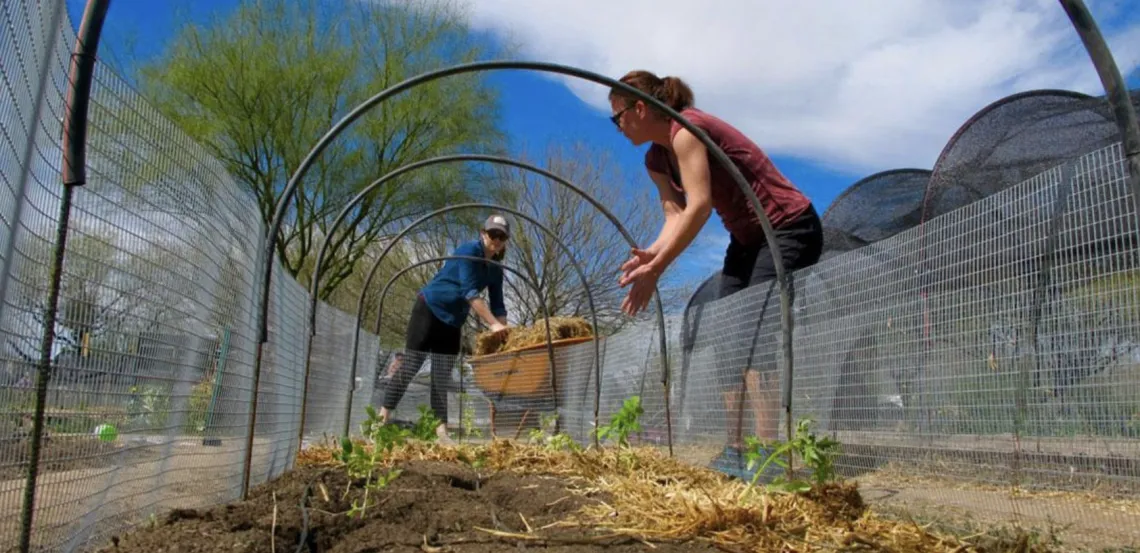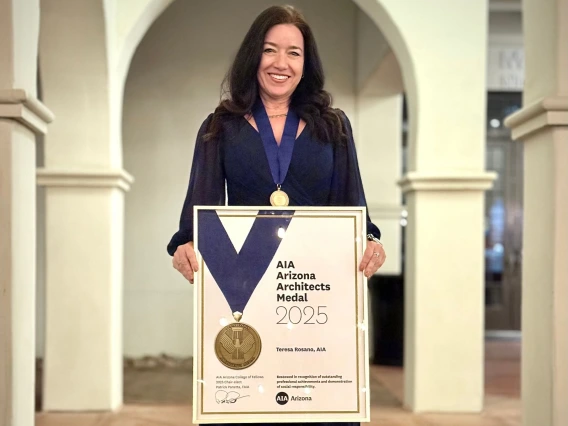Lecture Recap and Video: Courtney Crosson on 'Designing Food Systems in an Urban Desert'

Adequate access to healthy, affordable food remains a great challenge in many urban areas. Among a range of interventions, urban agriculture has been identified as an important strategy to help address urban healthy food access. While urban food production is growing in popularity, the use of potable water in traditional urban agricultural installations will exacerbate gaps in water demand and availability in water-stressed cities. This lecture examines the sustainable capability of urban agriculture through an integration of alternative water resources, urban vacant land and local nutritional needs. A spatial optimization model was developed to best allocate limited resources for maximal food production to address urban food deserts. The new model is applied to test the capability of relocalized food production in Tucson, Arizona. Results highlight that urban areas with restricted water access can substantially enhance their local food production capacity in an ecologically responsible manner. This research will be used as the foundation of a future studio course that will design small-scale farms for the Pima County Sustainable Action Plan on county-owned land.
Watch the Lecture
About Courtney Crosson
Courtney Crosson is a licensed architect and assistant professor at the University of Arizona, where she teaches classes on water in the built environment and community outreach studios. These studios, funded by the city, county or private practice, tackle critical issues in urban sustainability. Through exhibitions, books, presentations, workshops and even board games, the design work seeks to go beyond the studio and engage citizens and governments in solutions for their cities. Several of the designs produced in her studios have received public funding to be constructed.
Her current research advances decentralized water systems to address pressing problems facing cities—whether water scarcity in the U.S. Southwest or safe and affordable water access in informal settlements in Nairobi, Kenya. Her work has been published in peer-reviewed journals in architecture, engineering and planning.
She has won numerous awards for her teaching, outreach and research. Most notably, she received the Association for Environmental Studies and Sciences (AESS) national President’s Award for Educational and Environmental Collaboration and Excellence in 2017 and the Association for Collegiate Schools of Architecture (ACSA) / American Institute of Architects (AIA) national Practice and Leadership Award in 2018. She is currently serving an elected three-year term on the national board of the ACSA as a director at-large. She served on the AIA Los Angeles Board from 2013-2015. Crosson holds a Master of Architecture from Yale University and an Art History BA from Duke University.
Crosson’s work outside academia spans many scales and locations including Europe, Africa, Asia and North America. She has worked for BuroHappold Engineers in Los Angeles, Foster + Partners in Hong Kong, Muf Architecture/Art in London, Multiplicity in Milan and UN Habitat in a Nairobi informal settlement called Kibera. At BuroHappold she was the sustainability consultant for the net zero energy design of the new Los Angeles County Museum of Art (Atelier Peter Zumthor), University of California Santa Barbara’s Institute for Energy Efficiency (Kieran Timberlake Architects) and the net zero water and energy design of the new Santa Monica City Hall extension (Frederick Fisher Architects). At the master plan scale, she has guided energy and water reduction frameworks at Rice University, Los Angeles Union Station and University of California San Diego. Crosson’s first net zero design has been in operation since 2009; a seven-acre secondary girls boarding school in Muhuru Bay, Kenya, for which she was the project manager and lead designer.
Header photo courtesy of Courtney Crosson.



